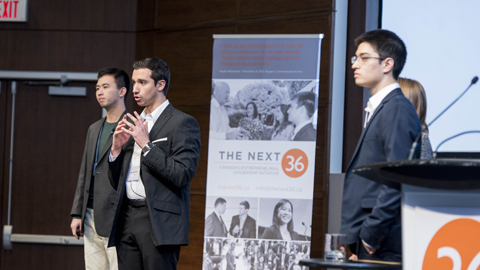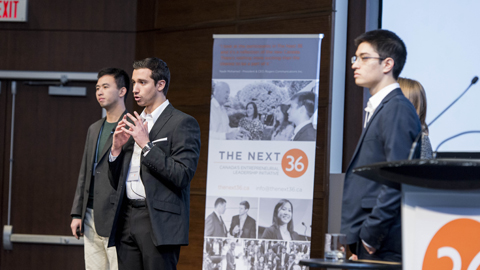
U of T Engineering nurtures a culture of entrepreneurship in its students – a strategy that pays off over and over again. It’s no surprise then that 10 of 40 students from across North America selected for The Next 36 program are once again from U of T’s Faculty of Applied Science & Engineering.
This increasingly popular program is designed to train Canada’s next generation of innovators and business leaders. Competition this year was tough, with close to 1,000 applicants.
Those who are selected are given the opportunity to develop their business ideas and put them into action with help from Canadian business leaders, mentorship and lectures from world-class faculty over a nine-month period, according to Jon French, spokesperson for The Next 36. This entrepreneurship-immersion program also provides those selected with up to $95,000 in seed investment for new ventures.
“It is very rewarding from the work we are doing that the spirit of entrepreneurship is coming alive. Seeing 10 of our students among The Next 36 shows the message of innovation and an understanding of business is coming through,” said Joseph Orozco, Executive Director, Entrepreneurship – The Entrepreneurship Hatchery and Adjunct Professor of the Centre for Management of Technology and Entrepreneurship (CMTE). He noted that one of The Next 36 students has applied to the Hatchery program, which offers similar services, and he hopes to see more.
“I personally believe we all have an entrepreneurial seed inside of us. What we do here is allow that seed to flourish. It’s not always about creating your own business but being able to work in any environment, any company. These students are going to be better members of society,” he said.
That the spirit is alive is evidenced by the fact five of U of T’s Next 36 students are either enrolled in, or have completed Engineering entrepreneurship courses. And impressively, nine of those selected from the U of T came from Engineering’s enriched program, Engineering Science.
“There is a renewed emphasis on design and innovation in the Faculty of Applied Science & Engineering, and this is contributing to a culture of entrepreneurship in our students. Needless to say, I am extremely pleased with the performance of our students in this year’s The Next 36 competition and confident that they will make the most of this outstanding opportunity,” said Professor Mark Kortschot (ChemE), Chair, Division of Engineering Science, and himself an experienced entrepreneur.
Timothy Ahong (EngSci 1T3 + PEY) and James Schuback (EngSci 1T3) are two who made it onto The Next 36 list. They are on a team developing a wearable motion sensor which provides feedback on athletic technique and motion for a variety of sports. The device compares a person’s motion, whether it’s a tennis or golf swing, or other motions, to that of the pros.
“The Next 36 is an amazing opportunity, and I still can’t believe I’m doing this. Entrepreneurship is the path I’ve chosen after graduation, and I plan to pursue this or a related project,” said Schuback.
The U of T Engineering students in The Next 36 will be building their startups along with their co-founders (small teams applied) and mentors. The ideas presented by students included: a motorized blimp for filming events, a fashion consulting platform, leveraging GPS and Bluetooth to help parents monitor young children, and wearable technology for athletes.
Projects may change from the initial idea over the course of the program as Venture Day in mid-August 2014 gets closer – the program’s annual Capstone Event where ventures are showcased to investors and business leaders from across North America. It is also when the students will officially graduate from The Next 36 program.
The Next 36 was started as a way to address Canada’s shortage of high-impact entrepreneurs. The organization provides a resource-rich program to a select group of promising undergraduates, and was founded by a small group of entrepreneurs, business leaders and academics, a number of whom are U of T Engineering alumni.
This year’s student selection include: Timothy Ahong (EngSci 1T3 + PEY), Amir-Hossein Karimi (EngSci 1T4), Shums Kassam (EngSci 1T5), Vivek Kesarwani (EngSci 1T3 + PEY), Drew MacNeil (EngSci 1T5), Tejas Mehta (EngSci 1T4 + PEY), James Schuback (EngSci 1T3), Jonathan Yam (EngSci 1T3), Victor Zhang (ElecE 1T3) and Cheng Zhao (EngSci 1T2 + PEY).




